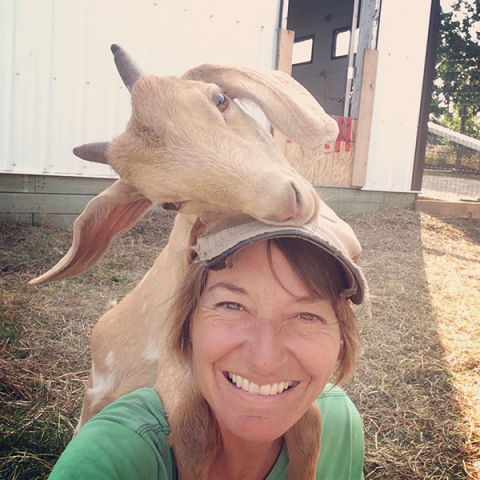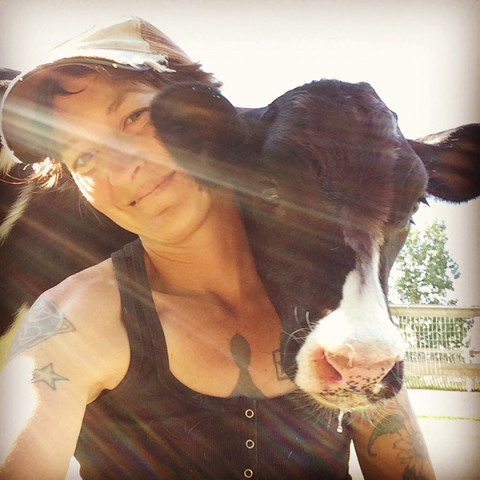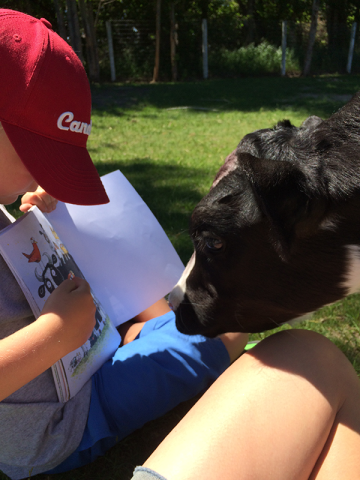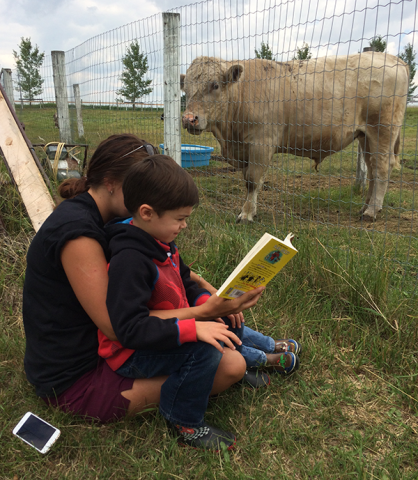
Janneane Madill should consider putting that on her business card. The self-described “founder and guardian” of The Alice Sanctuary in rural Alberta, some 45 minutes east of the hamlet of Balzac, provides a permanent home — or, as its characterized in their mission statement, “care and healing” — for rescued, surrendered, and abandoned farm animals.
But Madill’s vision transcends simply providing humane stewardship for wayward cows, horses, pigs, goats, donkeys, ducks, and chickens. Because of her background in social work, Madill recognized that vulnerable people could benefit from interacting with the animals, especially those in a rural setting that are typically underserved by social services.
As such, “the goal of The Alice Sanctuary is to empower, encourage, and inspire visitors” — including at-risk youth, seniors and garden variety 21st century stress-balls — “to find the tools they need to go out and make a positive change in the world around them… drawing from the resiliency and life-affirming presence of the animals who live here.”
The concept of rescuing neglected farm animals and then leveraging their indomitable spirit to inspire people is not new; California’s Gentle Barn launched with it 1999 and today operates additional farms in Tennessee and Missouri.
Yet good ideas are just that. Besides, not everyone has the dedication, fortitude, and sheer stamina to run a not-for-profit, interactive sanctuary with 100-plus animals that also endeavours to be as self-sustaining and eco-friendly as possible.
“Our hope is that every person who experiences The Alice Sanctuary will come away with a new awareness, a new sense of empowerment and hope for themselves, and a new level of compassion,” Madill declares on the Sanctuary’s website, which also gently spreads the vegan word via links and recommended reading. And so far, things are going to plan.
Samaritanmag spoke with Madill during her hectic and financially crucial summer tour season — she offers multiple private and public tours of the farm to groups of 25 maximum from June through August and guides each herself.
If you want to know what passion and compassion sound like, get Madill on the horn.
What brought The Alice Sanctuary into being?
Since I was 15, I was drawn to animal activism. I was vegetarian and aware of what I was eating. Then I came across this horse rescue and went to visit them. They also had cows, pigs, a couple of goats and I was awestruck. I didn’t understand why we needed a place like that which sent me on the path of information-gathering. I saw a need and decided I would rescue farm animals.
My old job was in social work. I was working with special needs people in a rural community. At the same time, I was interning at a large animal rescue, mostly a horse rescue. And I started delving into sanctuary research and what other sanctuaries were doing. I was also following The Gentle Barn. They were working with special needs programs which is something I really wanted to do because of my background. So, I decided it was feasible to start a sanctuary that would play to both my passions: rescued farm animals and people. It was all about bridging gaps and empowering, inspiring.

I had relatives with farms, but it wasn’t like I had lived on one or knew all the particulars. I knew nothing when I went into this (laughs) but that’s also where the internship came in. I wanted to learn about large animal care and what that looked like. I had no idea of the costs involved. I was just focused on the hard labour, and I did that for several months through a harsh winter. I realized then that I could follow through with my dream.
How do these animals typically find their way to you?
Many are owner surrenders. They also come from third-party situations like the SPCA or Humane Society that rescue and then seek more permanent placement. Sometimes other rescues will ask us for help with homing an animal. Owner surrender also refers to farmers; people who want to see animals go to a place where they live freely. Often, 99 percent of their livestock are shipped to slaughter.
Are these animals with you forever?
Yes, once they come to The Alice Sanctuary, they stay with us forever.
Has there been one creature in particular that has really validated what you’re doing?
Oh goodness, they all do! Every single one of them. Often these animals have had little contact with humans and so being with us means they have to learn to open up, which means I’ve had to open up also. I’m not super-verbal, and I’ve had to work on that. But in the end, we build this huge bond. There was a Charolais steer, Ferdinand. It was at a time where I was dealing with some stuff and it was a very busy time. One day I was sitting in his pasture and we were just talking as he ate his oats, and he walked right up to me. This 1,500-pound being came right up to me and put his head on my chest and allowed me to have my emotion. We have animals come in that have experienced extreme trauma and neglect. To see them bounce back and have unconditional love and trust is hugely rewarding. It makes me feel I am on the right path. But it’s not just for me. It’s also what happens when other people visit the Sanctuary. That validates The Alice Sanctuary for me.

Yes. I have found that everyone who comes to visit is in need of something in some form or another. It might be rejuvenation or compassion or feeling more loved or a feeling of encouragement. We also have people with high anxiety coming out. We work with at-risk youth, seniors. We have a reading program now in its second year that encourages kids to read out loud [to the animals] to improve their skills and confidence with a non-judgmental audience. No cow has ever complained about poor sentence structure.
And the tours are cornerstone to your fundraising efforts?
Yes, and summer is go-go-go. It’s huge for us. We do a combination of public and private tours June through August with a maximum of 25 people per tour. I guide the tours myself. I will introduce people to our residents and then detail the best way to interact with them so that everybody has a safe and positive experience. Then we have a vegan potluck lunch, and then our volunteers take people around to have some one-on-one time with various residents.
Can you put the scale of your operation in some perspective? For example, do you have an operating budget?
We don’t as of yet; our accountant is actually working on that. What I can say is that last year alone, just for winter, our hay needs were about $20,000. And that’s just for hay. I am driving back from the U.S. right now with about $2,000 of feed and fencing materials. Monthly, we’re looking at about $1,500 in feed for our residents. On top of that there is bedding, utilities for our heat… but I always, always maintain a medical care fund that is ready and topped up.
And how many animals currently live on the farm?
At least 100 if not more.

I had been renting out an old farm and after about four years of living there with my dogs, I spoke to my landlord and talked about my dream of opening a sanctuary. I offered to clean up the farm, repair old buildings and turn them into stalls and so on. He agreed. It got to the point where I was working full-time and running the Sanctuary. It was too much, and I had to either make a leap of faith and follow my dream or let it go and stop growing the Sanctuary. So, I took the leap and started calling around to farms near where I was living.
I contacted one of our supporters [name withheld by request] and asked if she knew anyone on the east side of Alberta who would lease or rent-to-own to The Alice Sanctuary. And she offered up her place. Just like that. She had offered hay before and had been a great supporter of what I was doing. Her farm is a beautiful spot and we couldn’t have asked for a better space. Her goal was to not have to run the farm anymore, but she also didn’t want to sell it. The Alice Sanctuary was the solution. I am a full-time volunteer and I work on the farm to maintain the lease agreement that we have.
Volunteers must be a part of the equation of running the Sanctuary?
Yes, I have superb volunteers who do everything from cleaning up the poop to helping with events. In total we have about 70 on our list, 30 of whom are consistent.
You must be up at 5 am and then just drop into bed at 11?
I wish I could just fall asleep! I am always fretting about something; email I should return or social media posts I should be making. Admin is not a strength. I’d rather be outside.
The Alice Sanctuary is named for your grandmother. Why?
She has been an inspiration all my life though I probably didn’t know it until I was in my 30s. Whenever I needed some extra encouragement with something, I would ask myself, ‘What would Alice do?’ And then I would just do it. That got me visualizing what Alice meant to me. The Alice Sanctuary denotes a state of being which I thought would be obvious to everyone and of course it wasn’t (laughs). But that’s OK. I wanted to create a space that was very creative and eye-opening. I have learned that by expanding my vision I can see and experience so much more in nature. This is a state of being; believing anything is possible. You just have to believe you can do it. I sometimes feel this wasn’t even driven by me but by something much bigger. That’s why I say I am the founder and guardian… sometimes I believe it’s not me but beyond me.
(Please support Samaritanmag's original journalism by making a PayPal contribution to info@samaritanmag.com so we can increase the amount of content and writers we hire. Samaritanmag is the anti-tabloid, covering good people trying to change bad things)